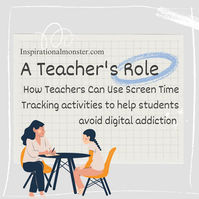Social media has become an integral part of our daily lives, especially for students. While these platforms offer connectivity and information, excessive usage can lead to addiction, affecting students' focus, mental health, and academic performance. As educators, guiding students away from social media addiction is a crucial responsibility.
Here's how teachers can help:
Understanding the Issue of Social Media Addiction
1. Education and Awareness: Start by educating students about the impact of excessive social media use. Discuss the psychological effects, including anxiety, low self-esteem, and reduced productivity. Highlight the importance of a balanced approach to technology.
2. Recognizing Addiction Signs: Educate students about the signs of addiction, such as spending excessive time online, neglecting responsibilities, and feeling anxious when unable to access social media. Encourage them to recognize these signs in themselves and their peers.
Promoting Healthy Habits
3. Digital Well-being Workshops: Organize workshops focusing on digital well-being. Teach strategies for healthy social media usage, emphasizing the importance of breaks, setting boundaries, and mindful usage.
4. Model Healthy Behavior: Lead by example. Demonstrate healthy technology habits by setting boundaries on your own social media use. Encourage students to find a healthy balance between online and offline activities.
Creating Supportive Environments
5. Open Dialogue and Support: Create a safe space for students to discuss their challenges with social media. Be open to conversations about their struggles and provide guidance without judgment.
6. Alternative Activities: Encourage extracurricular activities, hobbies, and projects that divert attention from social media. Offer options for constructive and engaging offline activities.
Integrating into Curriculum
7. Media Literacy Lessons: Integrate media literacy into the curriculum. Teach critical thinking skills to help students assess the credibility of online information and understand the persuasive nature of social media content.
8. Research Projects: Assign research projects that require students to use technology responsibly. Teach them how to utilize social media as a tool for learning and research rather than mere entertainment.
Collaborating with Parents
9. Parental Involvement: Collaborate with parents by hosting workshops or providing resources on managing screen time at home. Offer guidance on implementing healthy technology habits within the family.
Empowering Responsible Usage
10. Encourage Self-Regulation: Teach students to self-regulate their screen time by using apps that track usage or setting designated hours for social media access.
11. Reward Offline Achievements: Acknowledge and celebrate achievements and contributions made offline, reinforcing the value of activities beyond social media.
Conclusion
As educators, it's imperative to equip students with the skills and knowledge necessary to navigate the digital world responsibly. By fostering a supportive environment, promoting healthy habits, and integrating responsible social media usage into education, teachers can guide students away from social media addiction, encouraging a balanced and mindful approach to technology.











Comments